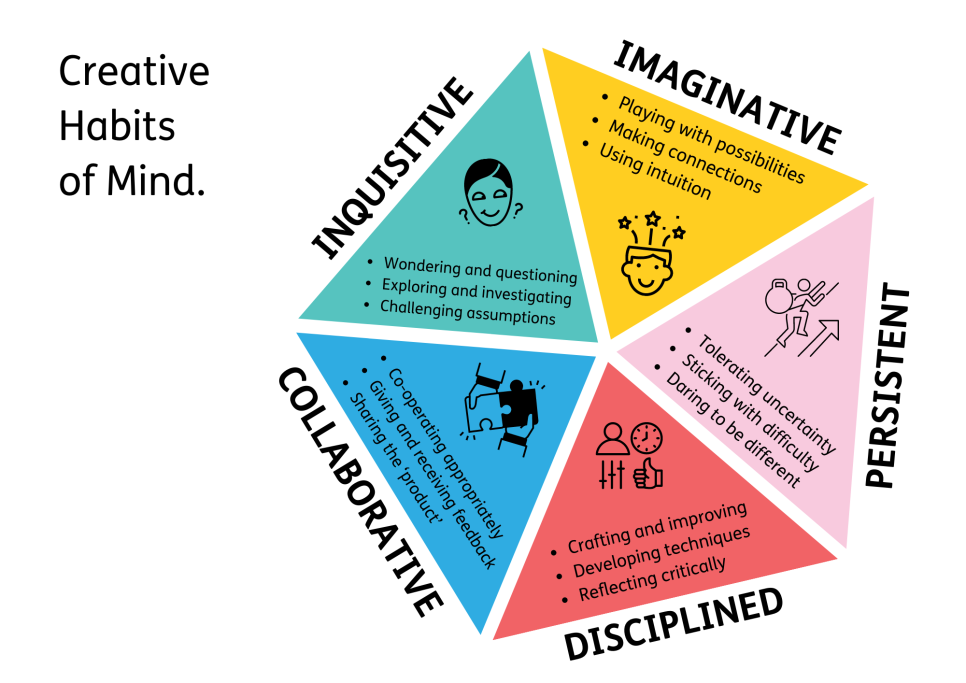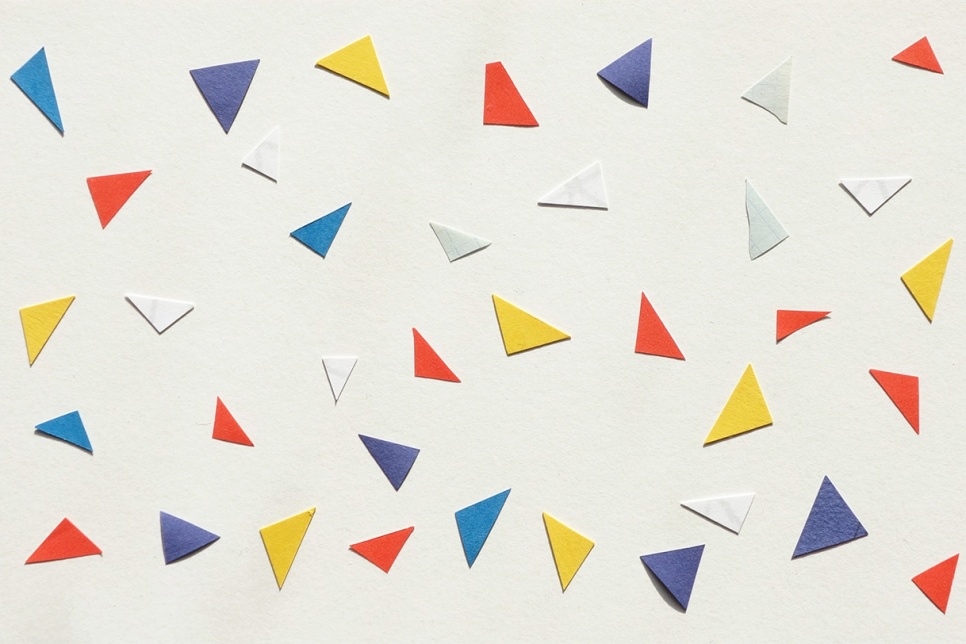Arts Council of Wales' Creative Learning Wales programme focuses on developing creativity and creative approaches to teaching and learning across the curriculum within schools in Wales.
One of the fundamentals of Creative Learning Wales is how it defines creativity. This is done through the tool of the '5 Creative Habits of mind'. Originally compiled from the work of Guy Claxton, Bill Lucas and Ellen Spencer from the Centre for Real World Learning at the University of Winchester (2013), this tool is now in international use including here in Wales. In addition to education, it can be adapted to be used in the context of any field.

The creative wheel can help creative individuals to:
• Use creative language to help them build confidence in using the Welsh language
• Become more aware of their creativity in nurturing the language
• Questioning, making connections, innovating, problem solving, communicating and collaborating
• Consider how to create opportunities for developing creative skills in the use of the Welsh language
• Helps to reflect and grow
Examples
Word games.
"Hide an object with a Welsh name. Several challenges or games can take place from the action. What matters is that the Welsh names of the objects will be used."
Purpose - To learn, memorize and recite new vocabulary
Resources - None, this can be done verbally. This will be a game with 2 or more people participating.
The activity
Step 1 - As a group, decide on the object you would like to hide. The object will need to be accompanied by its Welsh name only.
Step 2 – One person will be required to hide the object from the others. Everyone else will need to find the object once it's hidden.
Delving deeper
Why not add other words to the game. For example, if the person trying to find the object is near or far from it, why not give clues. This is, "Cold (oer)" and "Hot (poeth)" or "You're cold (Rwyt ti’n oer)" and "You're hot (rwyt ti’n boeth". Can you add more words?
Or
After a while, why not add more than one object to the game. For example, more than one object can be hidden simultaneously or separately to extend your vocabulary.
This activity could develop your creative practice..
| Curious | Collaborative | Imaginative | Perseverance | Disciplined |
|---|---|---|---|---|
|
|
|
|
Whispering words / stories in a group. This game is based on (Chinese Whispers). You can play with the medium by using making words / translating words for alternately/using sounds
Purpose - To learn, memorize and recite new vocabulary
Resources - None, this can be done verbally. This will be a game with 3 or more people participating.
The activity
Step 1 - In a circle, a person will need to whisper a sentence in the ear of the person to their left. The sentence can be as short and as long as you feel confident as a group for it to be.
Step 2 – The person to the left receiving the sentence will need to whisper the same sentence to the next person to their left, and so on.
Delving deeper
Why not add made-up words for some fun. The word may sound similar to other Welsh words.
Or
Let's start with a Welsh sentence. Alternately, the sentence will need to be translated from Welsh to English, and so on.
This activity could develop your creative practice...
| Curious | Collaborative | Imaginative | Perseverance | Disciplined |
|---|---|---|---|---|
|
|
|
|
|
Examples
Language sounds (letters) games
Welsh consonants.
Produce resonances and sounds from the consonants of the Welsh alphabet. Have fun using them creatively. Try to compose, record, visualise the sounds and play with them through movement and role-playing exercises.
Purpose - To learn, remember and recite consonants
Resources - None. This can be done verbally. This can be done as an individual or with others. Depending on your creative practice, you may want to add resources to the game
The activity
Step 1 - Choose 1 consonant of the Welsh alphabet - "b, c, ch, d, dd, f, ff, g, ng, h, j, l, ll, m, n, p, ph, r, rh, s, t, th"
Step 2 – Express that consanant out loud and listen to what your body wants to do. You can sing the consonant, shout the consonant out loud in a theatrical manner (angry, happy, excited, anxious), or express the consonant through body movement.
Step 3 – Repeat the consonant over and over again expressing it creatively clearly until it’s embedded.
Delving deeper
Why not add more than one consonant to the game?
Or
Let's create invented words using a variety of different consonants. Be as creative as possible.
This activity could develop your creative practice...
| Curious | Collaborative | Imaginative | Perseverance | Disciplined |
|---|---|---|---|---|
|
|
|
|
|
Create words from the sounds.
Increase confidence by combining sounds to create new words.
Purpose – To raise confidence and recite consonants
Resources - None. This can be done verbally. Pair game
The activity
Step 1 – Individual A is asked to create a verbal word that contains as many consonants as possible ("b, c, ch, d, dd, f, ff, g, ng, h, j, l, ll, m, n, p, ph, r, rh, s, t, th"). This can be an invented word or an existing Welsh word.
Step 2 – Person B will need to recite the word that has been heard.
Step 3 – Repeat the activity, but with individual B creating the word this time, and individual A repeating the word.
Delving deeper
Let's compete for the longest word with the most consonants.
Or
Let's find you the most unique Welsh word that contains a number of consonants.
This activity could develop your creative practice...
| Curious | Collaborative | Imaginative | Perseverance | Disciplined |
|---|---|---|---|---|
|
|
|
|
|

